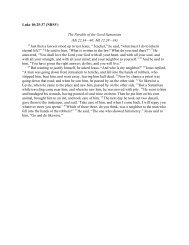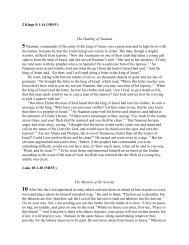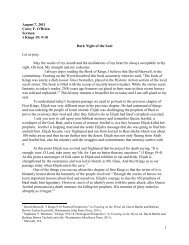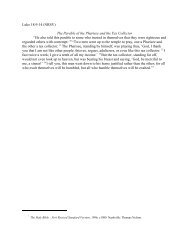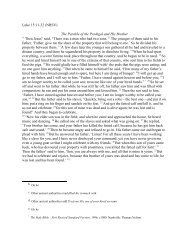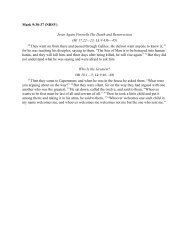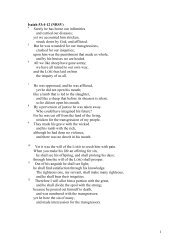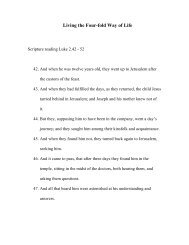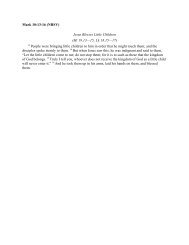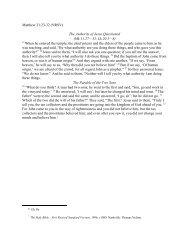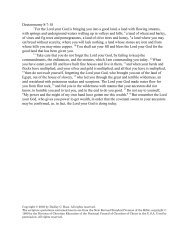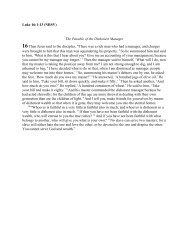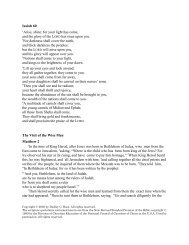Matthew 4:1-11 (NRSV) The Temptation of Jesus (Mk 1.12â13; Lk ...
Matthew 4:1-11 (NRSV) The Temptation of Jesus (Mk 1.12â13; Lk ...
Matthew 4:1-11 (NRSV) The Temptation of Jesus (Mk 1.12â13; Lk ...
Create successful ePaper yourself
Turn your PDF publications into a flip-book with our unique Google optimized e-Paper software.
and he says to him, “All these I will give you, if you will fall down and worship me.” This couldbe the knockout. But <strong>Jesus</strong> calmly absorbs the thunderous punch and strikes back with a righthook <strong>of</strong> his own, “Away with you, Satan! for it is written,‘Worship the Lord your God,and serve only him.’ Deuteronomy 6:13, and also 10:20.”<strong>The</strong> crowd cheered. <strong>The</strong> devil slunk away in defeat. And the angels came and tended thevictorious fighter, <strong>Jesus</strong> the Christ, heavyweight champion <strong>of</strong> heaven and hell. Whoa! What afight! What a contest! That pro<strong>of</strong>-texting stuff can get pretty rough!It’s a great story. And, it’s got the ending we would hope for. <strong>Jesus</strong> claims his victoryover Satan. He has a parade through Boston on a duck boat. Bill Belichick hires him as his newdefensive coordinator.But this story raises at least two interesting complexities. First, the devil can quotescripture. That means that scripture isn’t quite as simple and transparent as it might seem, or aswe might like it. We have right in scripture itself a case where the devil quotes scripture, and thewhole point <strong>of</strong> the story is that the devil is wrong. One thing we cannot help but take away fromthis story is that quoting scripture is no guarantee <strong>of</strong> speaking the truth. In the story that isn’t toosignificant, because we know the characters. We know that <strong>Jesus</strong> is supposed to be right andthat the devil is supposed to be wrong. But what about here and now. When pro<strong>of</strong>-textingbattles occur today, how are we to decide who is right and who is wrong? How are we to decidewho is <strong>Jesus</strong> and who is the devil? For Christians today these are important questions becausewe believe that the scripture has some form <strong>of</strong> authority, even though we may not all agree aboutthe details <strong>of</strong> that authority. And the questions are important because there are many importantdebates today in which the Bible is quoted by both sides. So, it’s important to know, if we can,how to understand the authority <strong>of</strong> the Bible and how to tell when a person quotes the Biblewhether that person is closer to <strong>Jesus</strong> or to the devil.<strong>The</strong> second interesting complexity is perhaps related to the first. If one were to take<strong>Jesus</strong>’ quotation <strong>of</strong> Deuteronomy about bread–One does not live by bread alone–as the last wordon his feelings about bread, one would judge that <strong>Jesus</strong> has a rather low opinion <strong>of</strong> it, or at leastthat it’s not all that important. That would prepare us poorly for the ways in which breadappears in the rest <strong>of</strong> the Gospel.Let’s stay with <strong>Matthew</strong>’s Gospel, since that’s the one from which we read thetemptation story this morning. In chapter 4 <strong>Jesus</strong> says that one does not live by bread alone andrefuses the devil’s challenge to change stones into bread.Yet, in <strong>Matthew</strong> 6:<strong>11</strong>, <strong>Jesus</strong> teaches his disciples the prayer we say together everySunday. He says we should pray, “Give us this day our daily bread.” In <strong>Matthew</strong> 7:9, in a versethat echoes this mornings story, <strong>Jesus</strong> says to his listeners, “Is there anyone among you who, ifyour child asks for bread, will give a stone?” In <strong>Matthew</strong> 14 and 15 we have the story <strong>of</strong> feedingthe five thousand. When the hour became late, and crowds became hungry, <strong>Jesus</strong> did not say tothem, “Tighten your belt, friends. No one lives by bread alone.” Nor did he send them away toget their own bread. In one <strong>of</strong> the most important stories in the Gospels <strong>Jesus</strong> demonstratesGod’s promise <strong>of</strong> abundance. He multiplies five loaves and a few fish in order to feed the crowd<strong>of</strong> 5,000. And then, finally, in 26:26, at the last supper, when he is giving his disciples finalinstructions, he leaves them with the symbol second in importance only to the cross. <strong>The</strong>passage says, “While they were eating, <strong>Jesus</strong> took a loaf <strong>of</strong> bread, and after blessing it he broke2



